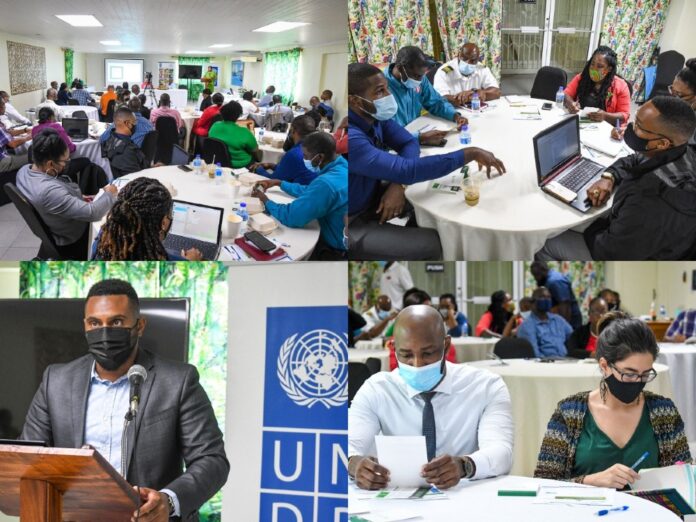
The future of the Commonwealth of Dominica is digital and inclusive, and each Dominican has an integral role to play in shaping the way forward for the Eastern Caribbean nation. This was the overarching sentiment reiterated at the Stakeholder Workshop held to discuss Dominica’s new digital direction. Through the National Digital Transformation Strategy, led by the government of Dominica in collaboration with the United Nations Development Programme (UNDP) Barbados and the Eastern Caribbean, the country will embark on a journey which leverages the power of technology to create jobs, improve services, catalyze post-COVID-19 recovery, and catapult the country towards its goal of becoming the first climate resilient nation in world.
Today marked a major milestone for the project, as the Digital Strategy Stakeholders Workshop hosted both online and in-person brought together a wide cross-section of key stakeholders to review progress and seek feedback on the planned transformation. This inclusive transformation and whole-of-society approach will ensure that the new strategy considers disadvantaged groups, women and children.
The workshop included the participation of the Cassanni Laville, Minister of Public Works and Digital Economy, who stated that “The development of a Digital Transformation Strategy for Dominica is in keeping with the Government’s vision for Digital Dominica” and “as a major pillar in building a resilient Dominica”.
Luis Francisco Thais, Head of the UNDP Dominica Project Office emphasized that the stakeholder consultation was a “breakthrough effort led by the Government of Dominica to accelerate digital transformation and prepare the country for the future challenges that this century brings to humanity”.
Speaking on the vision for the workshop Robert Tonge, Dominica’s national Coordinator for Digital Economy stated, “Public ownership of the new strategy is essential, and the process is taking a series of steps to ensure all Dominicans are involved. Through the UNDP Digital Readiness Assessment, stakeholder interviews, a public roadshow, a public engagement survey with nearly 500 responses and now this workshop, the government is reaching out to stakeholders and the public to ensure their priorities and concerns are reflected in this vison for the digital future of Dominica.”
The Dominican government remains committed to the advancement of the island nation and was the first country in the world to pilot UNDP’s new Digital Readiness Assessment (DRA) tool, developed to assist governments with taking stock of their digital transformation pathway and to identify priorities and gaps across government, business ecosystem, infrastructure, the regulatory environment, and human capacity.
Building upon the DRA, UNDP Barbados and the Eastern Caribbean are collaborating to develop a national digital transformation strategy. The strategy will be a key enabler in building resilience in the economy and creating jobs, supporting the innovation ecosystem, and delivering better public services in Dominica. Hannes Astok, Executive Director of the Estonia E-governance Academy and lead UNDP project consultant, noted, “Dominica is making great progress to advance the digital transformation of the country, by securing investment in key priority areas and by building an inclusive digital transformation strategy that takes a whole-of-society approach to ensure all ministries, all sectors and all people in
Dominica can reap the benefits of digital technology”. This initiative is a necessary step towards building a more resilient, responsive and adaptive Dominica.
This project is part of the work of UNDP Barbados and the Eastern Caribbean in its commitment to promoting economic diversification, job creation, and resilience with the “Blue Economy for Green Islands” vision. As the Caribbean continues to seek solutions to build resilience and livelihoods for traditionally vulnerable groups. UNDP Barbados and the Eastern Caribbean, in partnership with governments and stakeholders, remains dedicated to the advancement of inclusive and sustainable development throughout the region and building resilient communities that can withstand shocks and crises through targeted projects and programmes.

